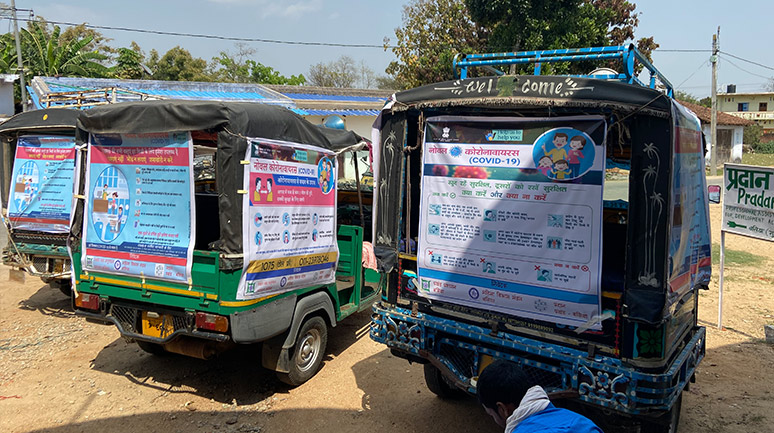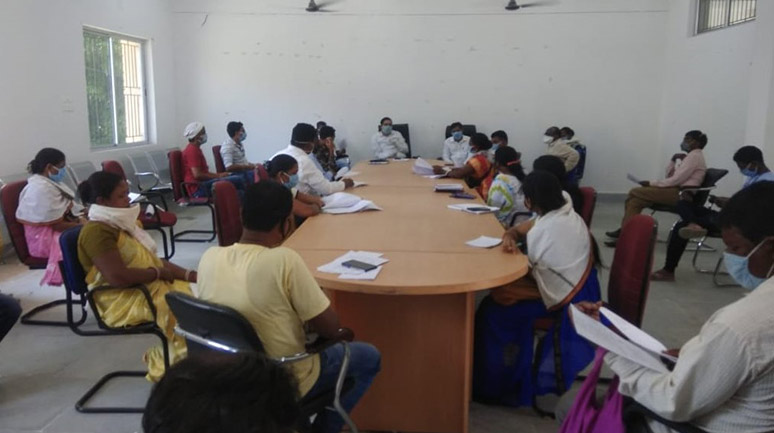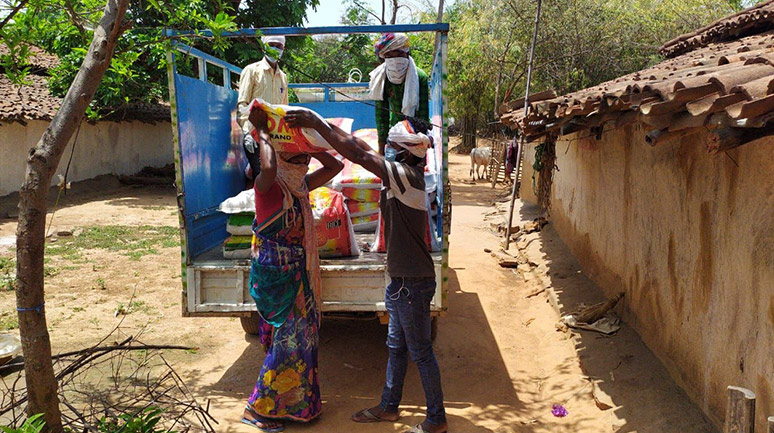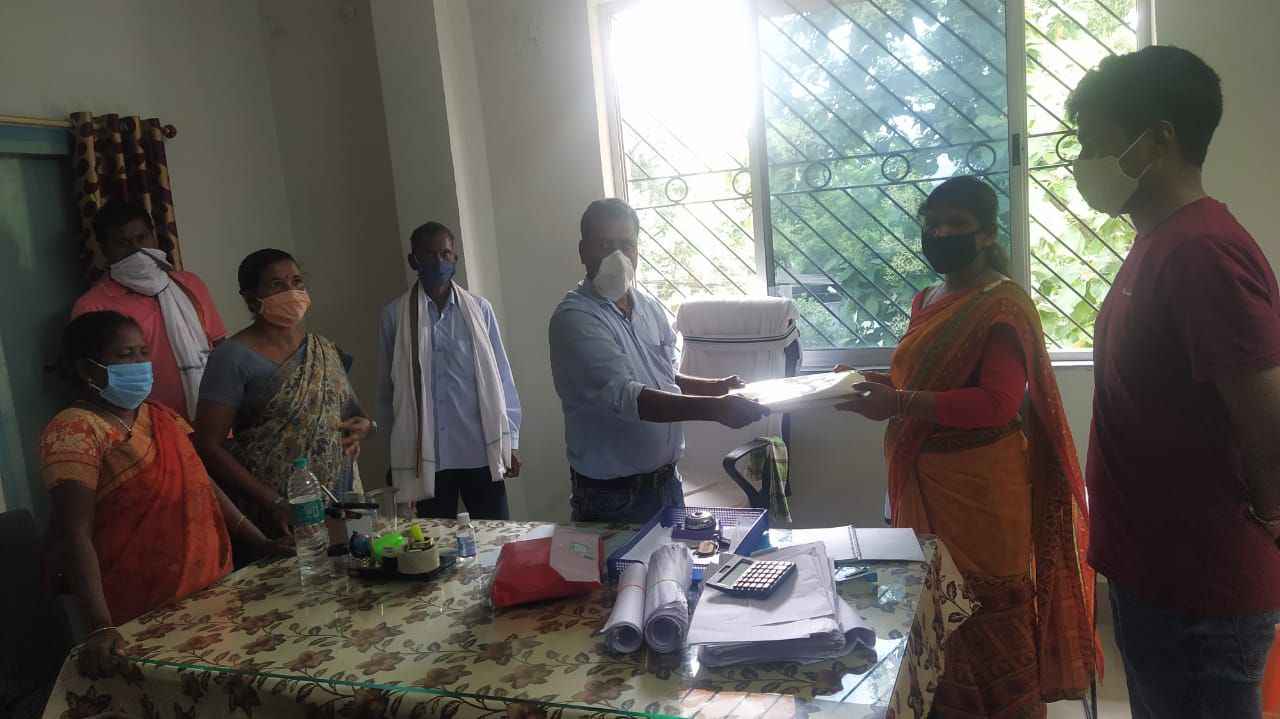Learning from the Pandemic: Collaboration is the Way Ahead


Block coordination meeting organised by the Block Development Officer with representation from the women’s Federation, PRADAN, PRIs and the administration
Realizing that it was staring at a deadly crisis of immense magnitude and proportions, the PRADAN team swung into action, collaborating with the local administration and institutions, to care for the survival and well-being of all members of the community.
W hen on 11 February 2020, the World Health Organisation (WHO) named the new disease that showed up in China as COVID-19, no one had an inkling that this virus would wreak such havoc and disrupt life so badly worldwide. Although the news of it spreading like wildfire and causing widespread deaths in countries such as Italy grew with every waking second, we never imagined it would deepen its grasp in India. Like a mythical demon’s shadow, it grew bigger with each passing day and its presence loomed over the metropolitan cities of our country. When a month later, we started receiving advisories on the COVID-19 pandemic from the government and our head office, to be careful and avoid social gatherings or community meetings, we saw how real it was. Things came to an absolute halt as our Prime Minister announced nation-wide lockdown on 22 March, and we realized that the disease had come to stay.
On 25 March, the first lockdown of 21 days was announced. We were stuck in our small rooms with cell phones as our only means of communication. We started calling our local cadres and the Federation leaders, informing them about the lockdown and the general precautions to be taken. Within days of the lockdown, panic struck, with migrant workers across the country marching back to their native places. We couldn’t remain sitting in our rooms; it was time to act. In the meantime, we also received a communication from our Executive Director giving us a free hand to do whatever possible to check that no community member suffers from hunger or dies of the disease. The only issue was that our movements were restricted because of the lockdown.
The PRADAN Palkot team called a meeting and chalked out a detailed plan keeping in mind the limitations of the lockdown. Our biggest strength was our rapport with the community. PRADAN had been working in the Basia block for more than nine years and there is no village where we have not marked our presence. Self Help Groups (SHGs), which were further congregated into panchayat and block-level Federations, helped in mobilizing the women. There are 2,564 SHGs, 157 Village Organizations (VOs), 7 Cluster Level Federations (CLFs) in the Palkot team and three block-level Federations (Mahila Vikas Mandal, Basia, Kamdara and Palkot), which have 34,306 members in its fold. The next in the brigade were the community cadres—community mobilisers, Aajevika Sathi, Krishi Sakhi, Pashu Sakhi, agri-entrepreneurs, community data collectors, and others, who acted as conduits between the community and us. Because the Palkot team had been working extensively with a partner organization—ANODE Governance Lab—in the Gram Panchayat Organization Development (GPOD) for the capacity building of PRIs, the PRI representatives were third in line. COVID-19 and the lockdown that came with it, however, was a double-edged sword for anyone who wanted to bring order amidst the chaos.
Everything had been brought to a standstill without any preparation time. Farmers depleted their stock of paddy stock, the PDS shops were closed and the health services were not in operation. This, combined with the fact that it was at the end of a financial year, increased the team’s problems exponentially. There were standing crops in the field ready for harvest and sale. The team had just promoted a large-scale watermelon cultivation in the region as a third crop, and with the curtailed movement, the farmers were on the verge of incurring huge losses should the crops not be sold on time. Everything came to a halt and people had no cash to afford even the basic necessities. This was coupled with a huge exodus of migrant workers, who were coming back to their villages without bringing any remittances with them.
The Palkot team also had to ensure, to the extent possible, that the region does not get affected by COVID-19. Creating awareness at the community level became necessary so that there was minimal spread of the disease. Also, because those who had migrated to cities for work were returning home, there was high risk of them carrying the virus from urban to rural areas. Therefore, there was immediate need to have quarantine centres to accommodate workers coming from various parts of the country. A problem of this magnitude cannot be controlled through solitary effort. Reverse migration made it imperative to create awareness on the spread of COVID-19 virus and there was need for collaboration with the administration, civil society, PRIs, community-based organizations (CBOs) and donors for immediate and coordinated action.
We called up Ravindra Gupta, the Block Development Officer (BDO) of Basai and Palkot blocks and assured him that every possible support and collaboration would be provided. The BDO immediately called us to his office to meet other department heads. A block-level control room was established, comprising block officials, medical officers, police officials, local media, representatives from the SHG Federation and PRADAN. Apanchayat-level committee was formed to respond immediately, comprising the Mukhiya (Head) of the Panchayat Samiti, President and the Secretary of Gram Sangthan (cluster-level SHG Federation), Jan Sevak, Panchayat Sevak and Auxiliary Nurse Midwives (ANMs). These committees were not enough to address village issues; therefore, a village-level committee has also been formed, comprising ward members, teachers, Anganwadi Sahiya and ASHA workers. This decentralized mechanism was developed for a coordinated effort to initiate COVID relief work, which included various measures such as forming task groups at the gram panchayat (GP) and block levels.
Reverse migration made it imperative to create awareness on the spread of COVID-19 virus and there was need for collaboration with the administration, civil society, PRIs, community-based organizations (CBOs) and donors for immediate and coordinated action.
O ne person per GP was given the responsibility to be in constant touch with the local GP-level elected representatives, Federation members, other leaders, Gram Pradhans, etc., to get a sense of the ground reality and, simultaneously, to provide clear information. The major objective of this was to ensure that accurate information was being disseminated, regarding announcements and notification from the Central and state governments as well as district and block officials. At the same time, the concerns and issues of the public were getting flagged to the respective departments and persons so that necessary action could be initiated in a timely way.
For immediate action, another group was also formed, with one representative from the block administration, one person from PRADAN, a few select personnel of the block administration, the health and police departments, who would take the necessary and immediate steps to address any crisis.

Awareness creation around COVID 19 through Jagrukta Rath Campaign
A mechanism was developed for a coordinated effort to initiate COVID relief work. This involved various measures such as:
WhatsApp task groups:
WhatsApp groups were formed at the GP and the block levels. All PRI representatives, the PRADAN team, members of the health department, media, Federation, block administration, police officials and some active citizens were the members of this WhatsApp group. The purpose of the WhatsApp group was to ensure two-way communication so that correct information passes from the block administration to the villagers and, similarly, the administration is abreast of ground realities. This group also contributed to generating large-scale awareness and addressing misconceptions and rumours. The effective use of WhatsApp in building and maintaining a network helped us implement the plan in an orderly manner.
Common Management Information System (MIS):
PRADAN maintained a Google sheet for the MIS that was accessible to all stakeholders. The MIS sheet maintained information about vulnerable families, status of relief material provided, status of returning migrants, situation at the quarantine centre, status of the community kitchens, etc.
The MIS sheet was updated every day with information received from the village and the panchayat-level committee. This was shared with the block administration for a real-time situation check. The block administration too added information and a daily analysis of the new data shared and discussed.
Control room:
A control room was set up at the block level in Basia, with the Sub-Divisional Officer, BDO, Police station officer, Medical Officer In-charge, a PRADAN professional, the Federation Coordinator monitoring the situation, in order to prevent and control the outbreak of COVID-19. In Basia, this control room was made available for the public round the clock. The members of this control room contribute in helping people avail of essential services. They monitor all the tracker sheets that have been filled at various levels and respond immediately. The control room works as a cohesive team for information dissemination, awareness creation, making food available to vulnerable families, coordination with all stakeholders, and maintaining social distance. This team believes strongly that together they will overcome this global pandemic. This is just an indication of what they have initiated collectively in Basia. They are in the process now of developing more strategic engagements towards mitigation of this crisis.
As a result of this systemic intervention and collaboration, the following actions are being taken in Basia block.
Quarantine centres at the level:
When the lockdown was announced, a large number of workers, who had migrated to the cities, started returning home. Because they were coming from the cities, there was fear that some of them might be the carriers of the virus. It was important to quarantine them before they reach their homes. This was one of the most challenging tasks for us because the workers had travelled long distances, through whatever means they could afford, and were in a very bad condition. Some had walked for miles and had children with them; they had no money or food. In these conditions, convincing them to stay at the quarantine centre was a big task. Village leaders, the Gram Pradhans and the Federation leaders took charge of convincing these migrants. Quarantine centres were set up at the GP itself with panchayat bhawans and school buildings being converted into quarantine centres.
In Basia block, over 2500 migrants returned within three days. PRI representatives took the immediate decision of setting up quarantine centres at each panchayat. All 15 panchayat bhavans in Basia were converted into quarantine centres. The Mukhiya arranged for mattresses, towels, blankets, pillows, etc., from the Fifteenth Finance Commission (FFC) fund. Chowkis (stools) and charpais (cots) were arranged by SHG members according to their own capacity. ANMs and Anganwadi Sahiyas were deployed in each panchayat for regular check-ups of the people at the quarantine centres. Soaps and sanitizers were also arranged by the panchayat.
Community kitchen centres:
The Supreme Court, in October 2019, favoured the setting up of community kitchens saying that the country needs such a system to tackle the problem of hunger. In Basia, there were 19 community kitchen centres functioning, to support the vulnerable in this crisis. The primary purpose of setting up community kitchens in Basia was to reach out to the needy, who were deprived, did not have sufficient resources and were without any family support. Destitute, physically disabled individuals, and the returning labour, who had lost their jobs and did not have cards to avail of ration were the primary focus. Besides these, people in the quarantine centres also needed access to necessities such as food. Thus, all the individuals residing in the village and who were identified by the panchayats and VOs as vulnerable were listed, to access cooked food from community kitchens.
Providing relief to vulnerable families:
The block administration, the PRI systems, PRADAN and all departments became more active, to ensure that nobody went hungry in Basia. Tracker sheets were developed by PRADAN to map families. Taking support from CBOs, the Gram Pradhan, ward members and volunteers, a list of such families were prepared and submitted to the panchayat and the block administration. The Jharkhand government also decided to give two months food (April and May 2020) in advance to all beneficiaries under the National Food Security Act. The block administration followed up on this and was supported by the Gram Pradhan and PRADAN. It screened those families that had applied for and were yet to receive their ration cards, and provided 10 kg of rice at the price of Rs 1 per kg. The Jharkhand government allocated Rs 10,000 to each panchayat as emergency food fund to help needy families in times of scarcity.

Distribution of dry ration at the door step during the lockdown period
Emergency tiffin service:
The block administration started this service to supply food to the people in quarantine centres, who were facing difficulties in arranging for food in this crucial time. There were dedicated phone numbers. Anybody could call for food and get it delivered to their homes. Cooked food was delivered through this initiative. Due to this quick and correct information dissemination at same time, everybody took equal responsibility and acted as per their requirements.
Support to stranded migrants:
Teams strategized to set up a support mechanism for stranded migrants. Control rooms and call centres were set up at the district and state levels. A list of migrant workers was generated for each village with the support of the collectives and the cadres. The list gave the data as to how many migrant workers have been working outside, where were they working, how many have come back, how many were stranded and who needs support. Through the call centres, stranded migrants were contacted. During this period, many students joined as interns from various universities and supported in running the control rooms. Civil society organisations were mapped across the states and were contacted to support the stranded migrant workers. Migrants were also connected with the Jharkhand state helpline numbers and immediate assistance was provided. The Palkot team supported around 6,000 migrants across three blocks by providing them relief where they were stranded. The team also helped 1,000 migrants register on the Jharkhand Sahayata App. Monetary support and food kits were distributed with the help of various other organizations.
Livelihood Support:
The lockdown affected the livelihoods of farmers, vendors, daily wage labour and small businessmen badly; many households had no livelihood options to survive. They were unable to engage even in kharif crops because they did not have any money. The reverse migrants came home empty-handed because most of them did not get their hard-earned money, which they could have invested in farm activities. To assist such households, the PRADAN team decided to engage with the Farmer Producer Organisations (FPO), with the help of trained agriculture resource persons. They began to interact with small farmers about quality agri-inputs for kharif and delivered these in time at the farmers’ doorsteps. The team engaged with SHGs and VOs in planning interim farming activities. The agriculture resource persons were given the task of visiting the field regularly and reporting any signs of disease or malfunction to both the farmers and the FPO so that immediate help could be rendered and it wouldn’t affect output. This engagement helped develop a strong link between the farmers and the FPO. The farmers were able to harvest sizeable quantity of quality crops. Farmers now look to the FPO for market linkages. Marketing is being explored to provide the best rate to the farmers for their crops. The FPO is expected to earn around 20 lakhs in this financial year. The team focused intervention efforts on marginalized farmers, who were seriously affected by COVID-19. The Azim Premji Philanthropic Initiatives—COVID Rural Livelihood Response (APPI–CRLR) Project supported 2,000 families by providing them free paddy, groundnut and lentils seeds along with fertilizers and bio inputs.

PRIs and Federations approached the District Horticulture Office to seek support on agri-inputs for the vulnerable families during the lockdown
Livelihood Generation through MGNREGS
The return of the migrant workers and job loss led to a liquidity crunch in the region. The opening of MGNREGS work by the government brought some respite to the families facing a cash crunch. The team engaged with the administration and the PRIs to initiate works under MGNREGS. The primary focus was to provide employment to the returnee migrant, leading to 3,265 new job cards were issued to the returned migrant workers and 4,18,225 person days of work was generated. The other focus was to create livelihood assets through MGNREGS work. The team engaged in creating awareness around the schemes under MGNREGS, with the support of Federation members. Works such as mango plantations in fallow land and the construction of water harvesting structures were given priority. This created more person days as well as long-term assets in the villages. Gram Sabha meetings were organised to approve the MGNREGS, and in the period just after the lockdown a total of 88 gram sabhas were organised and the MGNREGS plans approved. The government of Jharkhand also initiated Birsa Harit Gram Yojana, which provided support to families to plant fruit trees in fallow land through MGNREGS work, thereby providing employment to landless families.
| Interventions | strong> Basia Block | Palkot Block | Kamdara Block | Total Coverage |
|---|---|---|---|---|
| No. of hamlets in which awareness creation initiatives undertaken | 363 | 380 | 271 | 1,014 |
| No. of community kitchens supported | 21 | 20 | 14 | 55 |
| No. of quarantine centres Supported | 19 | 20 | 11 | 50 |
| Net no. of vulnerable families receiving food kits | 1,550 | 2,014 | 1,220 | 4,784 |
| Net no. of cadres and families receiving PPE and sanitary kits | 185 | 180 | 165 | 530 |
| No. of community surveillance cadres | 80 | 73 | 85 | 238 |
| No. of families supported through various means, including awareness creation | 8,500 | 8,000 | 7,500 | 24,000 |
| Total no. of migrants returning to their homes | 2,980 | 2,505 | 2,220 | 7,705 |
| No of migrants medically tested and in quarantine centres | 2,120 | 1,760 | 1,456 | 5,336 |
| Total no. of elderly persons (65 and above) | 3,208 | 3,233 | 3,146 | 9,587 |
| Number of elderly persons supported by PRADAN with food kits | 823 | 737 | 765 | 2,325 |
Learning from the Pandemic
It is now almost nine months since the first lockdown was announced. Although COVID cases are still on the rise, life has started normalising, especially in the rural areas…what is now called the ‘new normal’. The pandemic has given us a new perspective on our approach, our way of working. As things get back to normal, we wanted to document how all of us—the different stakeholders—came together and worked for a common cause. We wanted to write about this experience because it helped us learn about the strengths and weaknesses of each stakeholder and how we could complement each other for a more sustainable transformative change.
Nothing brings us, as a species, together like a crisis. This has been proven in these recent times. The helplessness we felt at the initial phase of the virus reaching us was replaced by a sense of satisfaction when each family in Basia was benefitted through our interventions. The work we did in Basia became a model for other blocks; our work was possible only due to the collective efforts of PRADAN, local government bodies and the administration. What seemed to be an impossible task was made easy with the mobilization of the SHGs, coordinated governance, and the gram sabha, which identified the vulnerable groups, making it easier for us to reach out to them in time. Other blocks sought our support in helping their panchayats implement the structure. For the first time, PRADAN, the government, administration, and the panchayats were aligned; this provided us the impetus to extract the learnings from our efforts, revisit our approach to design a more inclusive and collaborative approach.
Millions have been spent in the past on the possibilities and efforts of collaboration among the stakeholders in a society; a pandemic did what humans were too scared to do: effective collaboration.


3 Comments
Worth reading with great details. Keep writing and sharing to spread the words of good effort made at grassroots.
Thanks you for sparing the time to read . Will definitely try to bring out the nuances of “grassroots”.
Thankyou Bhashkar for your words!